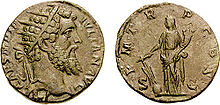Second year of the four emperors
The year 193 AD is referred to as the second year of the four emperors (sometimes also the year of five emperors ) . In that year - after the assassination of the Roman emperor Commodus on December 31, 192 - four men were proclaimed emperor: Pertinax (January to March 193), Didius Julianus (March to June 193), Septimius Severus (193–211) and Pescennius Niger as counter-emperor (193–194). Ultimately, Septimius Severus was finally able to prevail in 197 after his victory over another pretender to the throne, Clodius Albinus , who was elevated to emperor in 195 .
The first year of the Four Emperors was AD 69, when civil wars broke out after Nero's death .
The emperors of 193
Pertinax
On December 31, 192, Emperor Commodus was murdered. Pertinax was immediately proclaimed his successor. He tried to restore the state finances, which had been shattered by his predecessor, through austerity measures. But this made him unpopular with the Praetorians . He had some of them executed because of a conspiracy. Therefore, on March 28, 193, he was murdered by members of the Praetorian Guard.
Didius Julianus
After the death of Pertinax, the reputation of the Empire reached a low point when the Praetorians auctioned the imperial throne to the highest bidder, Senator Didius Julianus . However, the new ruler did not keep his promises, could not gain respect and was murdered on June 1st after two months. It was not recognized in the provinces.
Septimius Severus
Soon after the murder of the emperor Pertinax, Septimius Severus was proclaimed emperor in Carnuntum , the capital of Upper Pannonia , in April . He then hurried to Italy and took Rome on June 9th without resistance, declaring himself the adoptive son of Emperor Marcus Aurelius , who died in 180 . He prevailed against the competitors by first appeasing Clodius Albinus (a fifth pretender, see below) diplomatically, then eliminating Pescennius Niger in a bloody war and finally turning against Albinus. In 197 he was sole ruler. He founded the dynasty of the Severi and tied it demonstratively to the Adoptivkaiser to by (fictional) presented itself as an adopted son of Marcus Aurelius and his two sons Antoninus called.
Pescennius Niger
Gaius Pescennius Niger was anti-emperor from 193 to 194. After the murder of Emperor Pertinax, he was proclaimed emperor in Syria , where he was governor, in April . The following year he was defeated by his rival Septimius Severus and killed on the run.
More pretenders to the throne
Especially in English-language research, the year 193 is also referred to as the Year of the Five Emperors , because a fifth pretender, Clodius Albinus , appeared. The latter agreed to negotiate with Septimius Severus, who granted him the title of Caesar and promised to appoint him his successor. When Septimius Severus made it clear in the following period that he was actually planning his sons Caracalla and Geta as successors, Albinus was proclaimed Augustus in 195 . The statement in the Historia Augusta that Albinus claimed the rank of Augustus as early as 193 before he came to an agreement with Septimius Severus is mostly considered to be implausible in recent research.
If you wanted to count all the pretenders to the throne of the year among the emperors, 193 was even a "six-emperor year", since Pertinax 'father-in-law Titus Flavius Sulpicianus , city prefect of Rome, vied with Didius Julianus when the imperial dignity was "auctioned". Therefore, although Sulpicianus was not proclaimed emperor, the term Year of the Six Emperors for the year 193 is occasionally found in Anglo-Saxon literature. In German-language research, on the other hand, only the year 238 is usually referred to as the six-emperor year .
literature
- Anthony R. Birley : Septimius Severus. The African Emperor. 2nd Edition. Batsford, London 1988, ISBN 0-7134-5694-9 , p. 81 ff.
- Zeev Rubin: Civil-War Propaganda and Historiography. Latomus, Brussels 1980, ISBN 2-87031-113-3 .



